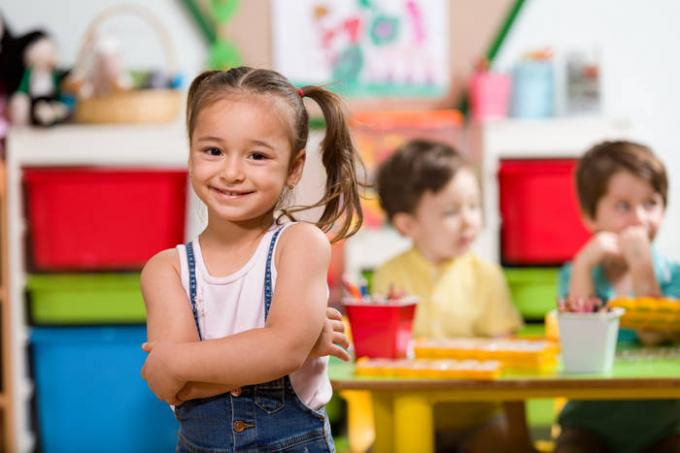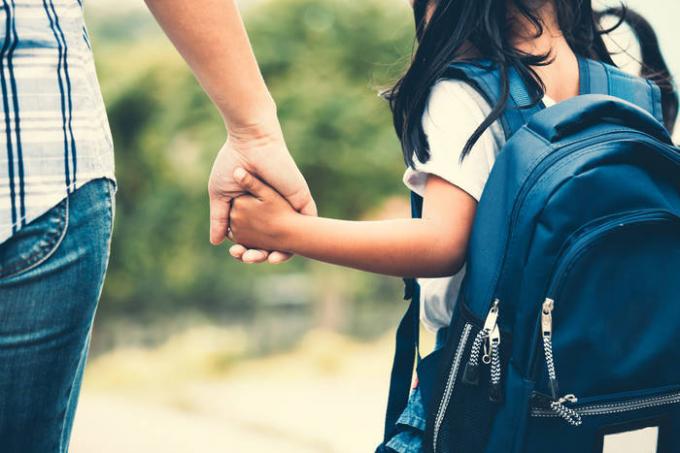Svetlana Roiz, a well-known child psychologist, author of "Magic Wand for parents", "Where does Angel "," Practical Rebenkovedenie "offers effective ways to help your child adjust to school
Parents are important to be attentive, to give the necessary support and understanding. Work through the proposed experimental psychology points to the song about the wonderful school years did not seem to you and your child a mockery of reality.
1. Signs of physical, bodily readiness for school - the beginning of the change of teeth
All school load - intellectual, emotional, physical fatigue - will fall on the little body. If it so happens that our graders teeth have not yet begun to change, now we begin to vigorously strengthen the body. Meanwhile, what you believe - vitamins, homeopathy, a balanced diet, exercise, mode... In the first week of school is often the immunity can not cope with the new challenges.
2. Psychologist, conducting the interview in front of the school, the kid asks questions about motivation
- Motivation is a game (baby goes to play school). And a child playing by the rules. If he is tired of playing "All sit za party", it stands in the middle of a lesson and begins to ferment, talk or eat. This baby takes a lot of toys to school. Motivating your child can "ripen", but the first time is important, of course, patience and creativity parents to pipsqueak still not decided to "come out of the game."
- Social Motivation: the child goes to school friends. And he no longer will be talking and hanging out. He needs help to build a relationship, and a child can learn to refuse, saying, "With me no friends."
- Achievement motivation: "I'm going to school for" The Twelve. " In the first class did not put estimates. And always learn from the 12 points is not possible. And if we do not give such a child "permission" to be different, not to allow him not to justify our ambition, he can become a perfectionist and neurotic.
- Motivation training - mature. When a child is learning. It happens too.
- First 2 weeks of the baby is very tired - the new regime, the overall stress in the family, getting used to a new relationship, a new unusual load. Please, take care of that, so that he could run out after school or, conversely, to sleep. Many first-graders become more emotional, tearful and aggressive in the first week of school - this is normal.
3. Shares of the brain that are responsible for the child's retention in the same position are included in the job after 7 years
- Kids can not be perseverance, not to run at recess, not to be active. If teachers do not have enough understanding of what children need discharge, and they do not give them such an opportunity, at least not to scold their first-graders for the state of "top" of the house. Suppose that after the school run on the street, the apartment, jumping on a trampoline.
- Only after seven years, many children can feel part of the system, abide by its rules. Feel part of the group that we - the students, classmates, children. Many kids do not react to them until the person be converted, for example, "Masha, open book."
4. At home it is important to play in the school play with toys eventualities
- Teachers often say that part of the first-graders in the word "children, open book" does not react by saying: "I am not the child, I Sasha."
- If the baby - the only child in the family, or he did not attend kindergarten, he was not accustomed to the noise, the constant presence of strangers close, touch. This baby can be very tired and complain that it hurt (a touch others it may be regarded as aggression).
- With him you need to play more in contact, physical games. Scarce could after school to be overactive or very sluggish.
- If the teacher is very different psycho, emotional reactions, stature, voice volume from the mother and loved ones of women, a child may be afraid. It is important to explain that the teacher speaks loudly not because it is angry, but only because he wants to hear it all the kids. At home it is important to play Noise Maker.

Top 11 secrets to easy adaptation to the school from Svetlana Roiz / istockphoto.com
5. In order to facilitate the adaptation of the kiddies, it is better in the first week of September to arrange meetings classmates boys in Game Center, on picnics, invite them to visit.
The sooner kids learn about, so will concentrate on their studies more quickly.
Every Monday, the child may be more difficult, "pull away from you." It is called "Monday syndrome". After a close with his parents on weekends difficult to integrate into a foreign environment. On Monday morning, we slow down the pace, hugging parting with a child give a piece of yourself - bracelet, badge, pendant.
The school - the sooner the better - make a collage of photos mordashek children, describes the class palms, cut them or just to hang on the walls. When a child comes into the classroom and sees "himself" on the palm, it immediately feels that he has a place and it is "their".
6. Make sure that the kid knows where the school toilet, knows how to use it, can ask to go to class
Many school neuroses associated with toilet difficulties: "If I'm spending power to ensure that something to hold me not to receive new information."
Many sensitive children perceive the world "nose". They will not have a product that smells bad to them, can not feel comfortable in a dining room filled with scents.
7. Warn teachers about the peculiarities of the child: what products does not eat, where to plant
Let's bring water, fruit, dried fruits, vegetables and biscuits. Remember, this is not a whim of the baby.
The first week of school the whole family asks: "How ?!" On the school - either good or nothing, as well as in the presence of a child - the teacher. If a situation arises in which the child is not safe, he should know that you are away from home it za mountain. But at home, he will get a dose of their upbringing.
The stronger the child usually distracted, the closer he is to the teacher to sit. To be able to direct contact with the help of an eye. And the more often you need to ventilate the room.

Top 11 secrets to easy adaptation to the school from Svetlana Roiz / istockphoto.com
8. Be alert to changes in the child's behavior
Unfortunately, not all teachers are adequate. Psychological trauma gets increasingly the child who watches the teacher yells at his classmate, or humiliates him. Be careful with what your child tells what to play outside of school.
9. Parents first-graders waiting for another test - refocusing credibility
Previously baby listens and is recognized as the only truth information from mom and dad, now in the child's speech may occur more often phrases like "And Marya said differently. You're wrong".
10. In the first class do not ask homework
But if you still in your school lessons a little set, every day to reduce its presence in the process of their implementation.
Books that, in principle, it is possible to give secretly and teachers: Adele Faber, Mazlish Edeyn "How to talk to children, so that they learn", "How to talk to children so that they listened to"; Galina Monina "How to overcome the difficulties in teaching children"; Katherine Kvols "Joy of education. How to raise children without punishment "; Julia Gippenreiter "Dealing with the baby. How?"
11. Make a "vaccination" against the school insults
For very sensitive, resentful children, especially if their names from easy to make a teaser, houses come up with different nicknames, that you can write out the names - in order to advance "to be vaccinated" against the school offenses (give an example of the Pope, his grandfather, a).
Baby-negativistam who are used to fix the attention only to the poor, after school to ask the question: "What was good?" If the child is difficult to initially begin the adults talk. In the evening you can play a game: it was a bad day for the (complex) and it was a good day.
Also you will be interested to read this: how to increase student attentiveness and diligence




